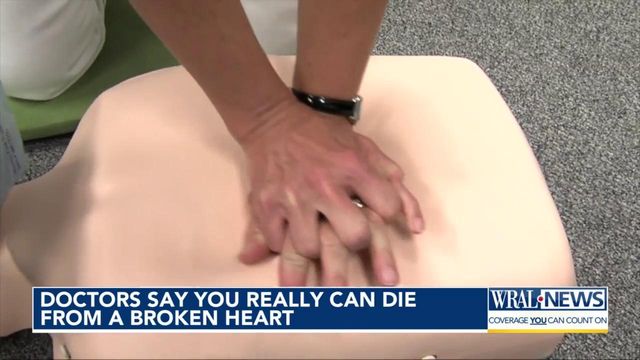Did you know you can die from a broken heart? It's called stress cardiomyopathy
The condition "broken heart syndrome" may sound made up but it is a very real condition that regularly sends patients to the hospital.
Posted — UpdatedThe condition "broken heart syndrome" may sound made up but it is a very real condition that regularly sends patients to the hospital.
Dr. Christopher Kelly, a cardiologist at UNC Rex, said broken heart syndrome can sometimes be bad enough to require admittance to the ICU. In some cases, it can even lead to death.
“It’s not just something you read about in romance fiction,” Kelly explained. “It has been increasingly recognized over the past 20 years and it is basically a heart event that happens in response to a really strong stressor.”
According to Kelly, those stressors could be physical or emotional.
Physical stressors could include something like an injury or severe infection. Emotional stressors could be brought on by a significant life event, like losing a loved one or going through a tough breakup.
“For reasons that aren’t totally clear but probably involve very high adrenaline levels ... your heart can actually become dysfunctional and develop heart failure,” said Kelly.
The condition is formerly known as stress cardiomyopathy. It occurs when your heart suddenly stops pumping properly.
Kelly said, even though it is largely unknown what causes it, cardiologists at UNC Rex diagnose patients with broken heart syndrome “at least once a week.”
“It’s a tricky diagnosis because people can come in looking exactly like they’re having a heart attack," Kelly said. "They can have chest pain, they can have changes on their EKG – which is the electrical signals on their heart. They can even have, in their blood, sort of chemical evidence of a heart attack. So we rush them into the procedure room expecting to be treating a heart attack but the arteries on the heart actually look normal.”
Women tend to be diagnosed more then men. Kelly cautioned it can happen at any age.
“We see people in their 20s all the way through their 70s or 80s that can develop this, and it can happen sometimes in their response to things that don’t seem that major,” Kelly said.
Once the true problem is located, Kelly said most people with broken heart syndrome recover quickly and without many long-term problems.
The doctor said Valentine’s Day and American Heart Month serve as good reminders to keep your heart health in check.
To reduce your risk of heart disease of any kind, Kelly said to make sure you’re getting at least 150 minutes of moderate exercise a week -- or 30 minutes five days per week -- and to find ways to manage stress and anxiety.
He also encouraged eating plant-based diets and checking your blood pressure and cholesterol regularly.
“A lot of people for New Year’s resolutions decide to become healthier,” Kelly said. “If your resolution was to lose weight or join the gym or change your diet, I think heart health month is a great time to double-down on that. Unfortunately, a lot of people start the year very enthusiastic and by the end of January they’ve already given it up.”
CPR can double, and in some cases triple, a person's chance of survival after a heart attack. The American Heart Association offers training in communities around the state throughout the year.
If you experience chest pain, shortness of breath or are feeling light headed, seek medical care immediately.
Related Topics
• Credits
Copyright 2024 by Capitol Broadcasting Company. All rights reserved. This material may not be published, broadcast, rewritten or redistributed.





